Martin Mere WWT
Burscough, Lancashire
|

Featured Location Guide |
| Martin Mere
- WWT Martin Mere is one of the Wildfowl and Wetland
Trust centres, based in Lancashire. It covers 150 hectares and as well as being
home to many wild wetland birds throughout the year it is also a permanent home for
over 100 species of rare and endangered wetland birds from around the world and
many of these can be found in its waterfowl garden, which has planned pathways
to take you around the area so you get to see many of them. |
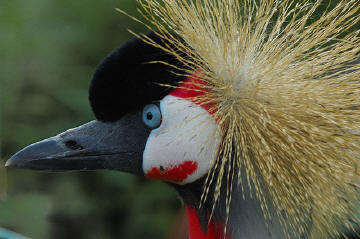

 African Grey Crowned Crane African Grey Crowned Crane |
|
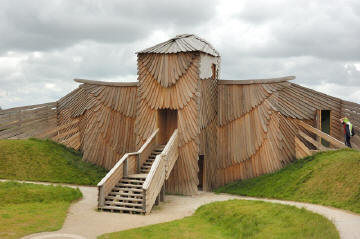

 Harrier Hide
Harrier Hide |
There are 10 hides spread around the site
overlooking the many areas of water and these allow you to see all the diversity
of the annual visitors in a natural environment. Some of these hides are close to the
waters edge so some birds do come close enough to photograph, one hide
overlooks a pond like area which is surrounded by trees so smaller British birds
can be seen both in the trees and when they come to the water for a drink.
The impressive Harrier Hide looks out across
the reed beds, and open span of waterways with large green vegetation areas for
the birds, to rest, give cover for their young and feed from. It has large
window areas as well as the normal hide look out points, and a pair of
binoculars, telescope or digiscope
is preferential at this hide to be able to see the birds up close. But it is an
impressive view. |
| Within the waterfowl garden
you will find an array of wetland birds, colourful and being able to carry
on their normal daily tasks, and close enough to photograph. The time of
year you visit will have an impact on what behaviours you see, from those
sunning themselves in the hot summer months, to those displaying to each
other during their breeding cycles and the many offspring some have. Within
this area you will find such species as ducks, geese, swans, flamingos,
cranes, etc. watch the Hawaiian geese they will come up close as they like
to nibble grain from your hand.
The paths within this area
take you on a journey and you get to see the many different species some
behind barriers to protect both them and you, but others are free to roam
their enclosure amongst you, so sometimes you can get quite close up to
photograph close head shots. This area of the park is colourful not only
with the wildlife, but also some of the structures like this Japanese
gateway, and the flora and fauna, but again what plants are on offer will
depend on the time of year you visit. |
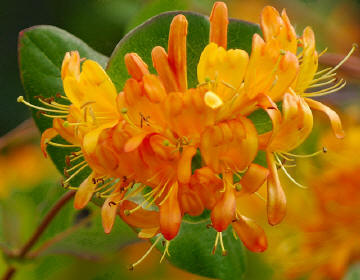

 A Bit of Flora A Bit of Flora |
|
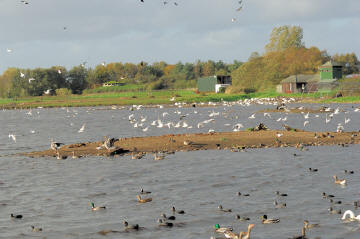

 A view across the Mere A view across the Mere |
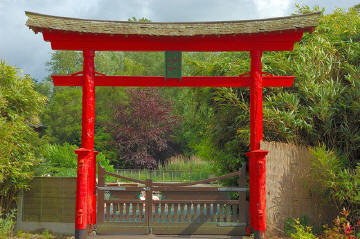

 Japanese Gateway Japanese Gateway |
Beavers
When we visited last, at
the end of 2006, they were in the process of building the beaver enclosures, but
as you probably saw on BBC Autumnwatch 2007 the beavers are now there. They are
European Beavers and are the worlds second largest rodent, and spend their time
excavating canals and building dams and lodges. They are vegetarian and are fed
everyday on root vegetables, leaves and fruit and this allows the visitor to get
a glimpse of them, as being nocturnal you would not normally see them during
daytime hours.
It is a good year-round wetland wildlife
attraction. Each time you visit there will be something different to see. There
are feeding times for both the permanent wildlife, and wild visitors so at times
you can see close up some of the wildfowl that are there permanently and those
that visit them.
Information boards are provided so you can find out the names of what you are
looking at and brief details of their natural habitat etc. Within the visitor
centre there is a cafe, gift shop and a gallery. Also on site is an In Focus
optics shop selling binoculars, telescopes and tripods.
Sightings
Just a flavour of what
can be seen,
one list for the summer months, the other for a winter month. Winter sees
spectacular flocks of pink-footed geese, can be up to 18,000 in number,
gathering to feed.
Sightings
1st
June 2006 |
Sightings
1st to 13th Dec
2007 |
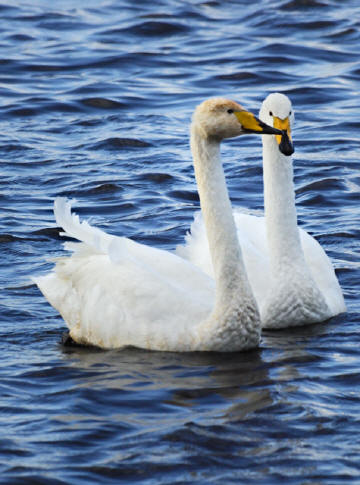   |
|
2 Black-winged stilts
still sitting on eggs.
Hobby, (2 seen 31/5)
Garganey (male 31/5)
Shelduck and Pochard
with young
15+ Tufted duck pairs
14 Gadwall
Kestrel, 3 Buzzard
Sparrowhawk
Common sandpiper (31/5)
14 Avocet + 7 chicks
12 Dunlin (75+ 31/5)
Black-tailed Godwit
25+ Oystercatchers
Ruff (male in full
breeding plumage 31/5)
Redshank + chicks
Snipe (drumming)
50+ Ringed Plover + 4-5
chicks
100+ Tree Sparrows with
first broods
Whitethroat
Sedge and Reed Warblers
Cuckoo, 40+ Swifts
Swallows, House Martins
|
1500 Whooper Swans
2000 Pink-footed Geese in to roost,
with 800 on the reserve form mid-afternoon.
Birds of Prey; Merlin, Marsh Harrier, 2 Peregrines,
Sparrowhawk, Kestrel, Common Buzzard, Barn Owl
2000 Lapwing
500 Shelduck
2000 Teal
2400 Mallard
400+ Pintail
Kingfishers
10 Cormarant
Grey Heron
Jack Daw
20+ flocks of Long tailed Tit
Goldcrest
Thrushes including Mistle, Song, Fieldfare,
Redwing and Blackbirds |
.
| Further information Grid
|
Location: |
WWT Martin Mere Wetland Centre, Burscough, Lancs |
|
Ceremonial County: |
Lancashire |
|
Grid Reference: |
SD428143 |
|
Map Link: |
VIEW MAP
 |
|
Aerial photo: |
|
|
Route(s):
|
|
|
Best Times to Visit: |
Winter months have a significantly higher
number of birds, like whooper swans and geese due to our visitors from the
colder north. |
|
E-mail: |
info.martinmere@wwt.org.uk |
|
Website: |
http://www.wwt.org.uk/centre/121/martin_mere.html
 |
|
Other useful
websites: |
|
|
Nearby Locations: |
|
|
Other Relevant pages: |
|
|
|
|
Planning Grid
|
Location: |
WWT Martin Mere Wetland Centre, Burscough, Lancs |
|
Grid Reference: |
SD428143 |
|
Getting there: |
6 miles from Ormskirk
and 10 miles from Southport, situated off
the A59, it is signposted from the M61, M58 and M6. There is a No.302 bus
from Ormskirk (except Sundays). Burscough railway station (on the
Southport - Manchester line) is approximately two miles from the centre.
Cyclists are always welcome, it is on two cycle routes. |
|
Access: |
Level access and hard-surfaced paths on main
routs. Hides accessible to wheelchairs, with low level viewing windows and
level access to ground floor of hides. Guide dogs only. |
|
Parking: |
Plenty of FREE parking on site, with reserved
bays for disabled visitors |
|
Facilities: |
Hides and easy paths for pushchairs,
wheelchairs. Cafe, picnic tables, art/craft gallery, optical shop,
gift and book shop, baby
changing unit, children's play area and children's activities. Accessible
toilets in car-park and throughout the visitor centre. |
|
Things To Do,
See and Photograph: |
Birds both wetland wildfowl, and British wild
birds, 100 permanent species residents, Beavers, flora and fauna, landscape
vistas, fungi, wood areas, insects. |
|
What to take: |
Binoculars, tripod, long lenses or even a
digiscope. If visiting in winter make sure you wrap up warm, fingerless
gloves would be useful as they keep you warm but allow ends of fingers to
still be able to use camera. |
|
Nature highlights: |
Over 100 species of permanent wetland birds,
on site like Hawaiian Geese, African Grey Crowned Crane, Flamingos as well
as all the visiting wild wetland birds that visit at different times of the
year. Other wild birds you might see include Marsh Harrier, Peregrine,
Merlin etc. Winter months visitors, Whooper Swans, Starling displays. And
since 2007 Beavers. |
|
Address: |
WWT Martin Mere Wetland Centre
Fish Lane
Burscough
Lancs |
|
Postcode: |
L40 0TA |
|
Telephone: |
01704 895181 |
|
Opening times: |
Open daily 9.30am-5.30pm (5pm November - February) Closed Christmas Day.
|
|
Charges: |
Free to WWT Members. Adult £7.95,
Concession (Students, Senior Citizens) £5.91, Child (4-16) £3.910, Family Ticket £21.36
Essential helpers assisting disabled visitors: Free |
|
Photo Restrictions: |
Photos can be taken for personal use only. All
commercial/stock library photography must be agreed in advance and is
subject to a fee. |
|
Other Restrictions: |
|
|
Special Needs Access: |
The centre has level access and hard-surfaced
paths on main routes. All hides accessible to wheelchairs. |
|
Special Needs Facilities: |
Free wheelchair loan, toilets in car park and
visitor centre |
|
Children Facilities: |
|
|
Dogs Allowed: |
trained assistance dogs only |
|

|
Please let us know any other information that we
can add to the Further information and Planning Grids or page and any errors that you discover. Before making a long trip to any location it is always
wise to double check the current information, websites like magazines may be
correct at the time the information is written, but things change and it is of
course impossible to double check all entries on a regular basis. If you have
any good photographs that you feel would improve the illustration of this page
then please let us have copies. In referring to this page it is helpful if you
quote both the Page Ref and Topic or Section references from the Grid below. To print the
planning grid select it then right click and print the selected area.
Please submit information on locations you discover so
that this system continues to grow.
|